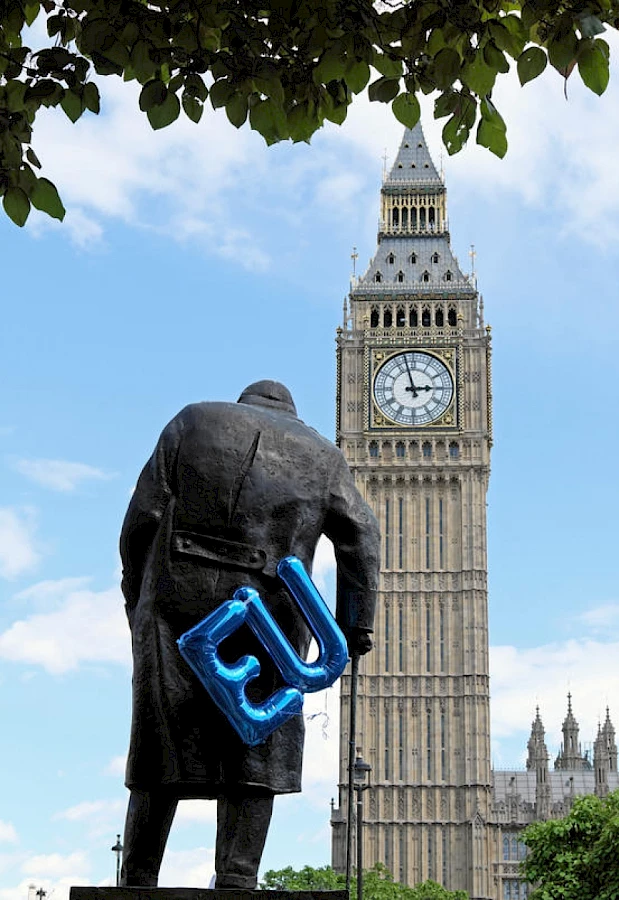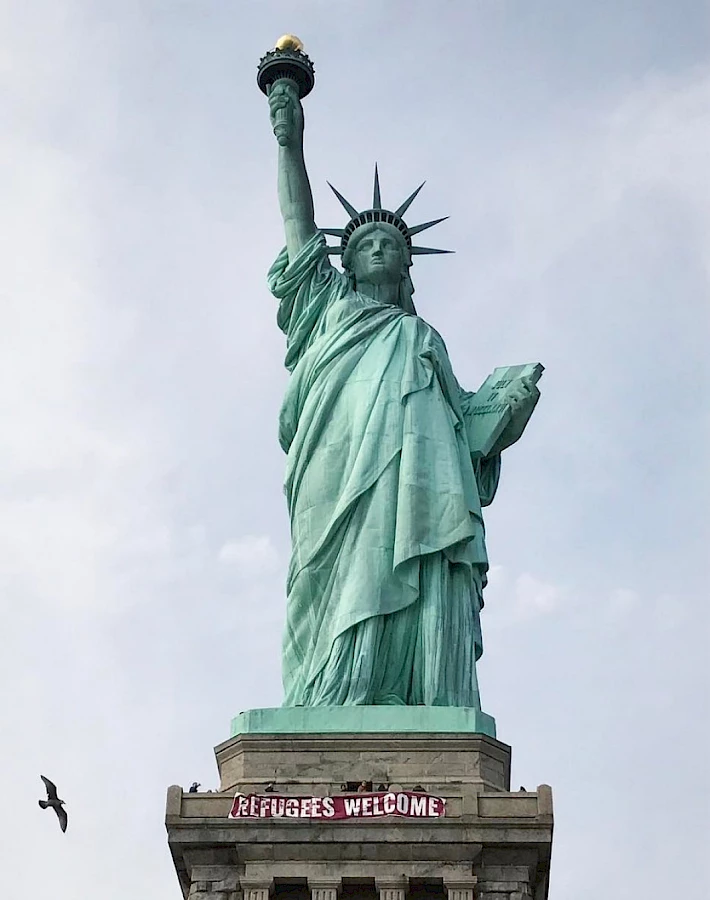
Winston Churchill statue with a blue EU balloon during the March for Europe protest in Parliament Square, London. Photo: Kathy deWitt.
In 1989, the fall of the Berlin Wall – symbolising most potently the collapse of the former Eastern Bloc/ Warsaw Pact alliance – and the alleged victory of capitalism over communism – epitomised most clearly by the publication of Francis Fukuyama's essay "The End of History?" (1989) – brought with it a triumphalist rhetoric surrounding freedom of movement, freedom of access, and the postcolonial collapse of the nation state. In the same year, the birth of the World Wide Web brought with it a corresponding utopian imaginary – a digital future of free knowledge exchange, information flow, cultural nomadism and global community. Within this framework people, much like mimes of information or goods to be shipped, were expected to take on, or at least to accept, that the status of migrancy was a core value in the shift towards a new world order; one guaranteed by smooth transaction and the free flow of financial exchange and built on precarity, flexibilisation, and cultural hybridity.
However, since the collapse of the global economy some twenty years later, the true contradictions that underpinned these halcyon ideologies of a corporatised global family have increasingly been brought into view. The real historical legacies of borders, territory, ownership, sovereignty and financial exploitation, often stretching back to the colonialist expansion of the Industrial Revolution and beyond, have brought unbearable pressures on the untenable realities of contemporary inequality and privilege. From the Iran-Iraq war, the Iraqi invasion of Kuwait, the fallout of 9/11 (as both the progenitor of the American-led War On Terror and the political evangelism surrounding the US/UK led invasion of Iraq) through to the short-lived hope of the Arab Spring and its subsequent collapse into the most recent crisis engulfing the Middle East, the growing legacy of the former West's demise looms large.
During this period, the seemingly exponential growth of the European Union, as it sought to gobble up large parts of the former Warsaw Pact, and its accompanying federal rhetoric of free trade and free movement, epitomised by the Schengen Agreement, has papered over the cracks of growing fiscal and judicial centralisation within key member states (most notably Germany and France). The financial conditions in Italy, Spain, and especially Greece have underscored a contradictory rhetoric of cultural liberalism, freedom of access and opportunity, accompanied by severe financial constraint and control of member states through the Eurozone trading bloc.
As we have seen over the last few years, primarily through the lens of a spectacularising media frenzy, the nomadic ideology of free movement and access, guaranteed by a tacit belief in the abstract inheritance of Enlightenment Democracy, has been accompanied by the imposition of border control, migration quotas and an alarming shift towards the political right (at least insofar as issues of migration are concerned). In September 2015, these contradictions manifested themselves in makeshift fencing and aggressive defensive postures began to be adopted by EU member states confronted with the influx of refugees across roads, bridges, rivers, and railway lines.1
What none of us could have fully predicted in 2015 would be the speed and calamitous aggression of the 'global community's' response to this condition. Within a year the formerly 'United Kingdom'2 had voted for Brexit – a narrow margin of victory in a yes/no, in or out referendum. What this catastrophic political miscalculation on the part of the then Prime Minister David Cameron illustrated (Cameron had pinned his hopes of re-election in 2015 to a vote-winning promise of this referendum – which would keep the Eurosceptic right of his own party in check – on the belief that the 'British people', whoever they are supposed to be, would overwhelmingly vote 'remain') was that a largely neglected 'underclass' of the population, who felt angry and aggrieved at their mistreatment by the present representational political system, aired their voice. The Brexit vote was, by and large, a vote against the privilege of Westminster and Whitehall as a seat of distanced, elitist and disrespectful power. It was fuelled by unprovable lies about the impact of 'immigrants' on 'sovereign job security' rather than any real debate about the relative merits or dysfunctions of the European Union or parliament. This 'underclass', once called a 'working class', had been abandoned almost two decades earlier by New Labour, their traditional political ally, who had forsaken them in the ruthless pursuit of the 'middle class' vote. During the run-up to the 1997 election, in which Labour returned to power with a landslide vote, it became increasingly obvious, to those on the traditional left of politics, that a Blairite 'Third Way' was leaving both core heartland of voters, and its core principles, behind. Left wing sentiments soon became 'old fashioned' and 'prosperity', built on a slightly less uneven distribution of wealth and access, became 'good'. Whilst it became increasingly difficult to differentiate between the political rhetoric of right and left, an unrepresented and overlooked majority, mainly situated in the former factory towns and mining areas that had driven the Industrial Revolution, became disenfranchised, cynical and angry.
This latent anger, hitched to a dewy-eyed fantasy of making 'Britannia' great again, has now secured an economic autonomy for the former UK which only seems viable if workers' rights are abandoned, desperate financial deals are struck with any willing nation (the former UK's recent arms deal with Turkey, despite the increasingly evident humanitarian abuses of the Erdoğan regime being a case in point) and the City of London continues to be 'open for business' as a deregulated tax haven for financial misconduct and illegal dealing on a global scale. Welcome to workhouse Britain.

A giant banner saying 'Refugees welcome' hangs on the pedestal of the Statue of Liberty. The banner was hung from the public observation deck on 21 February afternoon. It was taken down more than an hour later. Photo: Vitória Londero.
Similarly, the rust belt of America, the once comfortable white industrial working-class backbone of the post-World War II American expansionist economy, has rushed to the aid of Donald Trump in return for a range of obvious lies, vacant promises and 'alternative truths' about reconstructing America by building walls, both physical and metaphorical, to keep 'aliens' and migrants 'out'. In Trump's own words: "Let's make America great again".
I fear that both Brexit and Trump may only signal the beginning of our troubles. And that, consequently, any forms of resistance, artistic, political or otherwise, may need to be based on a recalibration of focus. Let us be honest, until relatively recently our 'enemy' has, more often than not, been neoliberal globalisation – an abstract shibboleth that functioned largely as the dominant political 'other' that we wanted it to be. This approach, in turn, was inflated by a sense that deregulatory government policies were pulling up the drawbridge of the Welfare State whilst, at the same time, using culture and art as a means to do the dirty work of neoliberalism on its behalf.
All of a sudden this shift has become more extreme and palpable – a wholesale recalibration towards new nationalism and government as mediatised business. The culture of Twitter and Facebook, which so recently provided us with the hope of the Arab Spring, turned rapidly into culture 'as' Facebook and Twitter. In the post-truth political landscape of Trump and Vladimir Putin – in which the President of the United States can take to the infosphere and respond to a Supreme Court overruling judgment against his own unconstitutional and racist dictats as 'bad', our familiar lines of resistance are in danger of being swept away. More alarmingly, our collective and constituent resistance to this newly developing shift to the right (and on behalf of whatever may remain of left-wing radicalism) can no longer be effective simply by pointing this new condition out. Not as long as traditional protests against such outbursts will be outnumbered by the rust-belt 'likes' and 'smiley faces' in support of Trump's global chest-beating and tub-thumping.
Within this complex, emerging – and horrifying – milieu, the role, function, ideological position and real legal (or illegal) status of migrancy has again come under closer scrutiny and the possibility of multiple abuse and/or reuse. Far from a simple noun to denote the positive neoliberal condition of human movement, or a verb to identify the action of this desired movement, migrancy has become, once again, a contradictory symbol of our status, fragility, precarity and provisionality under the present conditions of globalised capital, emergent nationalism and the overt shift towards government as business. At the same time, migrancy has become a political issue to be dealt with, an indicator of responsibility, and a cypher through which the ability of 'wealthy nations' to cope with fiscal challenge can be marked out as an ethical and moral imperative. Likewise, migrancy has become an embodiment of the other, a symbol of those who cannot cope: a mass, or tide, that threatens to engulf an established order and a comfortable way of life; a pariah come to take what is rightfully ours and, perhaps most depressingly, a phenomena in need of fiscal calibration and organisation. After all, how can we truly measure, in the eyes of a nationalist state, the difference between people as either freeloading financial burden or truly displaced refugees? And, if we are to do so, what are the means by which we can even begin to imagine such a distinction in the first place? Above all, what does this move towards a more complex and difficult relation with migrancy tell us about our new status within the shifting reorientation of post-post-communism?
These questions are no longer simply about migrancy, or the migrant 'problem': they are now forming the collective and constituent basis of our resistance to economically coagulated power and the systematic abuse and erosion of human rights the world over. Our fight is, more than ever, to give political voice and resonance to the overlooked, those who cannot speak, as our own 'democracies' seek to silence and strangle our rights and civil liberties too. In the wake of 1989, and the collapse of the Eastern Bloc, the popularised romantic notion of the global 'nomad' became currency within the newly globalised art world. The significance of this loose metaphor was obvious; border-crossing, mobility, hybridity, transnationalism and multiculturalism were all to be celebrated and the new identity of the globetrotting artist was its de facto embodiment. Nearly thirty years on, we now need to welcome the refugee and embody the social, political and economic challenge of the migrant, for the very survival of constituent alternative and possible change. Our mantra must be, now more than ever: Refugees are welcome; we are, all of us, migrant.
Reference:
Fukuyama, F. 1989, "The End of History?", The National Interest, Summer.
The views and opinions published here mirror the principles of academic freedom and do not necessarily reflect the views or positions of the L'Internationale confederation and its members.